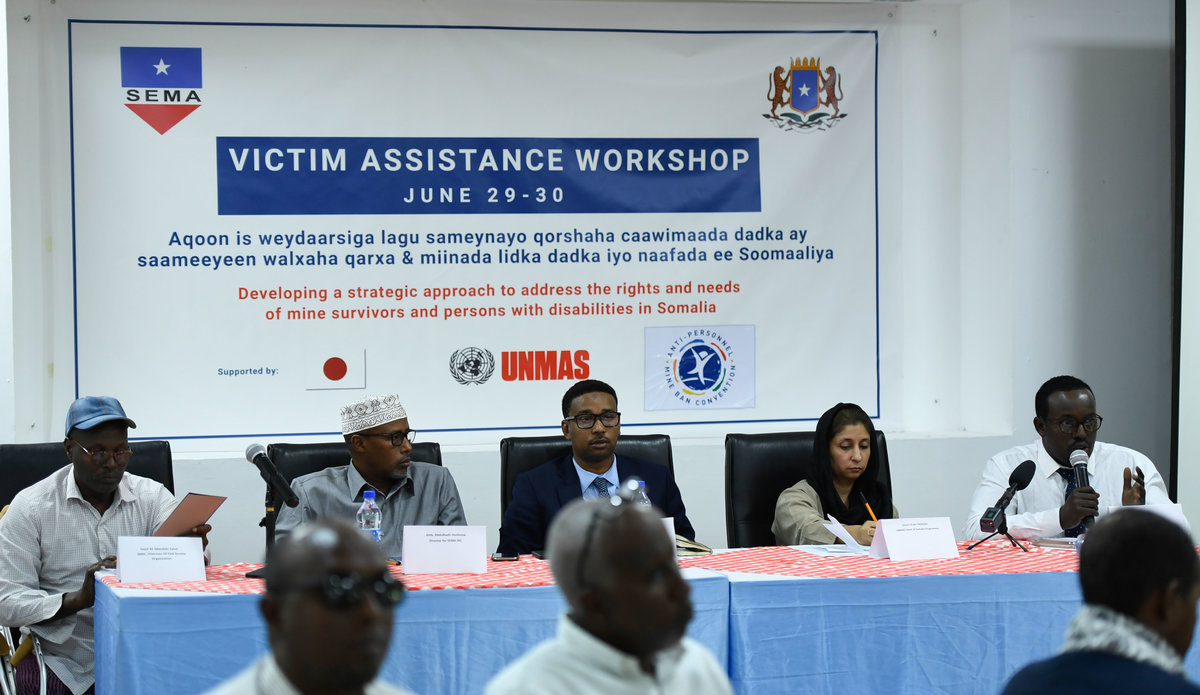Mogadishu: A two-day stakeholders’ workshop took place in Mogadishu, to discuss challenges and gaps with regard to existing victim assistance services and to share suggestions and recommendations for the development of an inclusive nationwide strategy and plan of action that can address the rights and needs of survivors and people affected by explosive hazards in Somalia. The workshop is a follow up to Victim Assistance Assessment conducted by SEMA jointly with UNMAS in 2018, which made specific recommendations including the development of a comprehensive and contextual victim assistance programme in Somalia.
The workshop held from 29-30 June 2019 in Mogadishu, attracted participants from the federal government and the federal member states of Somalia, and national non-governmental organizations, including with representation of mine survivors and persons with disabilities.
The workshop, which was possible with generous support of the Government of Japan, was facilitated by UNMAS working with the Implementation Support Unit of Anti-Personnel Mine Ban Convention, and the Somalia Explosive Management Authority (SEMA).
The works were very productive, with the sector making suggestions with regard to the prioritization of interventions, actors to be consulted in the process etc. Of note, the Galmudug State’s Gender Officer called for the involvement of Ministry of Women and the National Disability Council as vital in this process. It is envisaged that the strategy will be adopted by the federal government ahead of the fourth review conference of the Convention, which is slated for November 2019 in Oslo, Norway.
Present at the workshop, Abdinasir Saiid Muse, the Somali Deputy Minister of Internal Security, remarked “We need to focus our energies and work in close coordination with UNMAS and the disability sector to create a conducive environment that allows people with special needs to enjoy their full rights.”
Ms. Qurat-Ul-Ain Sadozai, the Head of UNMAS programme in Somalia said that assistance to victims of mines should be part of a broader framework to support persons with disabilities. “We need to look at how this can be addressed more holistically and comprehensively,” Qurat-Ul-Ain noted, adding that victim assistance is at the core of UNMAS’ work.
In May this year, Somalia became the 178th country to ratify the Convention on the Rights of Persons with Disabilities (CRPD) to safeguard and promote the rights of persons with disabilities. The ratification of CRPD is a positive development in addressing issues of disabled people and establishment of national or legal policy framework regarding people with disabilities.
Mr. Firoz Alizada, the Anti-Personnel Mine Ban Convention’s Implementation Support victim assistant advisor, who co-facilitated the workshop, noted that the formulation of an assistance strategy is crucial for safeguarding and addressing the rights and needs of mine survivors in Somalia.“Victim assistance is a pillar of the convention and all state parties to the convention have a responsibility to provide support to mine victims, victims of anti-personnel mines, Explosive Remnants of War and landmine survivors,” Mr. Firoz remarked.
Abdullahi Hassan, a Somali disability rights activist and chairperson of the Somalia Disabled Persons Cluster, welcomed the development. He said the strategy would enable Somalia to respond to challenges faced by mine survivors.

